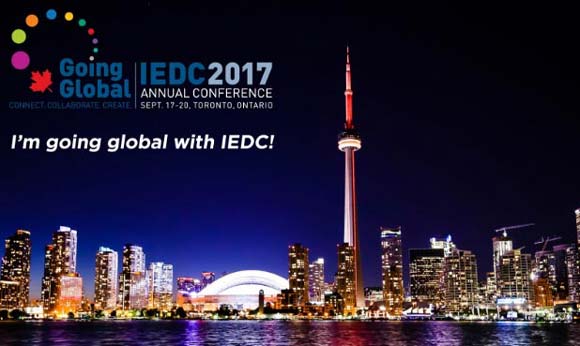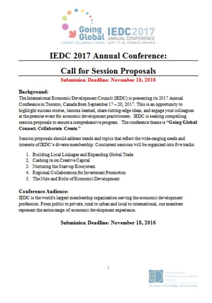|
Dear [[fname]],
President Abraham Lincoln has been credited with saying, "The best way to predict your future is to create it." Here's your opportunity to create a future speaking opportunity for yourself. Download the request for session proposal form to make your idea heard September 17-20, 2017. The deadline is November 18, just three weeks away.

 About the 2017 IEDC Annual Conference: About the 2017 IEDC Annual Conference:
Join us in Toronto, Canada from September 17-20, 2017. This is an opportunity to highlight success stories, lessons learned, share cutting-edge ideas, and engage your colleagues at the premier event for economic development practitioners.
The conference theme is "Going Global: Connect. Collaborate. Create."
Session proposals should address trends and topics that reflect the wide-ranging needs and interests of IEDC's diverse membership. Concurrent sessions will be organized into five tracks:
1. Building Local Linkages and Expanding Global Trade - Global trade, especially in terms of exporting, is vital to sustained economic growth. It creates local jobs, generates capital investments in machinery and equipment, encourages innovation, increases productivity and attracts foreign direct investment (FDI). An export-oriented economy can foster the development of business clusters through new joint ventures and help entrepreneurs reach new markets. In order to facilitate the trade and investment linkages, cities and regions are forging formal city-to-city connections, often times between North American cities and those cities in rising economies such as Mexico and China. This track will explore examples of successful trade and investment relationships between international cities and regions.
2. Cashing in on Creative Capital - Culture, sports, film, music and other creative industries are major contributors to communities around the world. From major movie productions to backend business and professional services, supporting creative industries can drive a new workforce, generate new revenue streams, and transform local economies. Universities and community colleges throughout the U.S. and abroad have expanded their technology and media programs to pave the way for the next generation of technicians and media artists. By partnering with museums, literary and culinary arts institutions, and festival/event associations, numerous downtown districts have undergone instrumental revitalization efforts. As the tourism industry continues to increase through these creative sectors, so will the capital gains of metropolitan, suburban and rural areas alike. This track will explore how economic development organizations can support the advancement of creative industries to further the workforce, business development and cultural economy of their communities.
3. Nurturing the Startup Ecosystem - Supporting entrepreneurship and small business creation is an economic development trend that will never go out of style. The majority of new jobs and innovation are developed from startups and small businesses. As the global economy transforms and competition rises, the need for new business formation throughout local communities has become ever more present. Organizations ranging from corporations, universities, foundations, and government agencies have all recognized this necessity. Fortunately, gone are the days when budding small business owners must venture into their entrepreneurial activities alone. The importance of establishing new means of economic growth has generated resources such as incubators, accelerators, main street revitalization grants, educational programs, and other supportive tools which help increase small business scalability. This track will examine the ways economic development organizations can embrace the startup ecosystem strategy within their communities through the bolstering of support for local startups and industry expansion.
4. Regional Collaboration for Investment Promotion - The benefits of inward investment are well-known; whether from foreign sources or the next town over, investment brings new capital and jobs to a region and the spillover benefits of new knowledge and talent can give the local economy an innovation boost. In order to attract investment, economic developers must take a regional approach. Companies make investment decisions based on the value proposition of the region, including such factors as size and growth of the local economy and population, labor force demographics, infrastructure and the regulatory environment. By presenting yourself as a region that can meet the company's needs, you strengthen your business case for investment. This track will look at how you can strengthen your community's assets in order to offer a total and irresistible package for prospective companies.
5. The Nuts and Bolts of Economic Development - From BRE to financing, some of the fundamental tasks of economic developers remain constant throughout the years and are the building blocks on which new trends and initiatives are built. This track is intended to help us revisit some of the nuts and bolts of economic development, take stock of current best practices, and anticipate future trends. This track will cover topics such as real estate development and reuse, marketing and attraction, neighborhood development strategies and workforce development strategies.
The call for session proposals will close before U.S. Thanksgiving on November 18, 2016. Thank you in advance for submitting your proposals by this deadline.
» Download the RFSP
Submission deadline: November 18, 2016.
|
|



